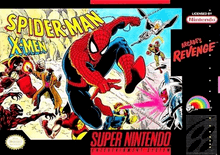Spider-Man and the X-Men in Arcade's Revenge
| Spider-Man and the X-Men in Arcade's Revenge | |
|---|---|
 Super NES cover art by John Romita | |
| Developer(s) |
Software Creations Unexpected Development (Game Boy) |
| Publisher(s) | Acclaim Entertainment [lower-alpha 1] |
| Composer(s) | Geoff and Tim Follin |
| Platform(s) |
Super NES Mega Drive/Genesis Game Gear Game Boy |
| Release |
Super NES Mega Drive/Genesis
|
| Genre(s) | Action, platform |
| Mode(s) | Single-player |
Spider-Man and the X-Men in Arcade's Revenge[1] is a video game first released for the Super NES in 1992 by Acclaim Entertainment. It was later released for the Genesis and Game Gear (under the Flying Edge brand) as well as the Game Boy. The game features Marvel Comics characters Spider-Man and the X-Men as they battle their captor, the villainous Arcade.
Gameplay
In the first level, the player controls Spider-Man who must use his spider sense to disarm several bombs located throughout the immediate exterior and maze-like entrance to an abandoned building. After the player completes this level, Spider-Man learns that the evil mastermind Arcade has kidnapped Storm, Cyclops, Wolverine and Gambit. The player must successfully complete each character's level (each set in Arcade's deadly "Murderworld") in order to get to control Spider-Man in a final battle with Arcade:[2]
- Spider-Man's levels: New York City rooftops with the bosses being the flying demon N'astirh and Shocker in the first stage, with Rhino and Carnage in the second stage.
- Storm's levels: Underwater maze level with Storm having a limited air supply. Her bosses are various machines used to control the giant tank-like levels.
- Wolverine's levels: Fun house first level, with duplicates of the clown villain Obnoxio the Clown as enemies and the boss being Apocalypse. A rampaging Juggernaut chases him throughout the second stage.
- Gambit's levels: Doom caves two levels, both of which take place in a cave where a giant spiked ball is chasing him; the first level boss being a giant playing card, the final boss a gigantic robotic version of Selene.
- Cyclops' levels: Two stages, each set in Genosha underground Sentinel mines, plus a final boss stage featuring Master Mold.
After completing each stage, the player controls each hero as they fight in similar-designed mini-levels themed after the "behind-the-scenes" of Murderworld.[2] The only character to have a significant change is Storm, who now walks, shoots multiple bolts of lightning rapidly and calls upon gusts of wind and jumps about four times the height of the other characters. The last level takes place inside a large room, where Arcade chases Spider-Man back and forth in a large Arcade-shaped robot, which operates like a Matryoshka doll, until Arcade is finally defeated. The X-Men stand-by at the edges of the room, occasionally attacking on their own.
Plot
Based on The Uncanny X-Men issue 123-125, Spider-Man has been noticing strange occurrences in the city as one by one, the X-Men are being captured by a man who calls himself Arcade. After witnessing Gambit's abduction, he tracks Arcade down to an abandoned building, where he, along with Cyclops, Storm, Wolverine and Gambit, are placed in the deadly games of Murderworld, a simulated program designed by Arcade to torture and kill his victims. After surviving the deadly traps, the X-Men escape only to be recaptured and it's up to Spider-Man to stop Arcade. After defeating him, he blows the building up. Spider-Man and the others survive but there is no sign of Arcade.
Development and release
According to Richard Kay of Software Creations, development of the game was fraught with problems: "Spider-Man And X-Men started going horribly wrong and Acclaim were screaming at us and threatening litigation and we ended up with three teams on this one game."[3] The Genesis and Super NES editions of the game are nearly identical, apart from different instrumentation in the soundtrack.
Reception
Reviewing the Game Boy version, GamePro commented the graphics are good but the controls are frustratingly imprecise and complained of the fact that players must re-solve the tedious level 1 maze every time they start the game.[4] They gave the Game Gear version a negative review as well, saying it retains the problems of the Game Boy version.[5] Electronic Gaming Monthly gave the Game Gear version a 6 out of 10, praising the ability to play as multiple different characters but criticizing the difficulty as overly high.[6] Brett Alan Weiss of AllGame criticized the Game Gear version for "awkward" controls, particularly of Spider-Man and its weak portrayals of the superheroes.[2]
References
- ↑ Handheld versions show this name on the title screen.
- 1 2 3 Weiss, Brett Alan. "Spider-Man/X-Men: Arcade's Revenge". AllGame. All Media Network. Retrieved January 22, 2012.
- ↑ Bevan, Mike (December 2013). "Bubbles, Baseball and Buzz Saws...". Retro Gamer (122). Imagine Publishing. p. 75.
- ↑ "Spider-Man and the X-Men in Arcade's Revenge". GamePro (58). IDG. May 1994. p. 126.
- ↑ "ProReview: Spider-Man and the X-Men in Arcade's Revenge". GamePro (59). IDG. June 1994. p. 144.
- ↑ "Review Crew: Spider-Man/X-Men". Electronic Gaming Monthly (59). EGM Media, LLC. June 1994. p. 40.
- ↑ Released under the LJN brand name on Nintendo systems and the Flying Edge brand name on Sega systems.